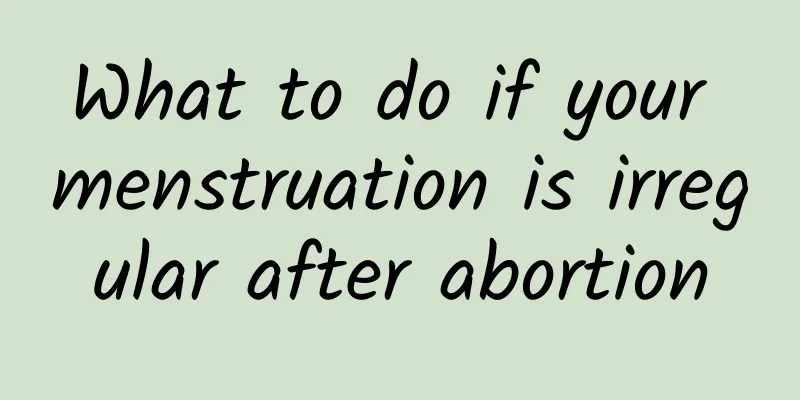What to do if your menstruation is irregular after abortion

|
Although the technology of contemporary abortion surgery is relatively high, it still inevitably causes harm to women's bodies. Many women will experience physical discomfort after abortion surgery. Menstrual abnormalities are a more common problem, mainly manifested as scanty menstruation, menorrhagia or irregular menstruation. We can take corresponding measures to regulate and improve them. So, how should menstrual abnormalities after abortion be restored? 1. Rest as much as possible: After the abortion operation, you need to rest in bed as much as possible and avoid overwork. Pay special attention to adjusting your work and rest schedule and ensuring adequate sleep. Only in this way can your body recover better, and then your menstruation will slowly return to normal. On the contrary, if you are physically tired or lack sleep for a long time after the operation, irregular menstruation may occur. 2. Adjust your diet: After the abortion, you should also adjust your diet and try to eat more nutritious food, which is conducive to the body's better recovery. Be sure not to eat spicy or cold food, which will not only affect normal menstruation, but also affect the body's normal recovery. 3. Relax: Many women may experience irregular menstruation after abortion because they are always sad and depressed. We should learn to control our emotions, release our stress appropriately, and relieve the negative emotions in our hearts by diverting our attention. 4. Hospitalization: Irregular menstruation after miscarriage is likely caused by residual embryos in the uterine cavity, and further diagnosis requires hysteroscopy. If this happens, another uterine curettage is required, which is conducive to better recovery of the body. Irregular menstruation after abortion is, in fact, more common in life. We should adjust our healthy lifestyle, pay attention to balanced nutrition intake, and let the body get enough rest so that menstruation can return to normal. If the abnormal menstruation cannot be improved in the long term, we should also be alert to possible gynecological diseases and must be hospitalized for examination and treatment in time. |
<<: What causes vulvar itching?
>>: What are the treatments for uterine fibroids?
Recommend
Anthocyanins protect the eyes, nourish the brain and control blood sugar! Avoid nutrient loss by paying attention to these 4 points
Anthocyanins are hot! Many people who love beauty...
How long does it take to get menstruation after abortion
After an abortion, many women are concerned about...
What are the diagnostic criteria for menopause?
Throughout a woman's life, she will enter old...
Does low menstrual flow affect egg quality?
For female friends, they experience menstruation ...
Will endometriosis get better after cesarean section?
Endometriosis may be relieved after cesarean sect...
Experts analyze the specific clinical causes of cervicitis
In fact, cervicitis is not terrible. As long as w...
Women should understand the dangers of uterine fibroids
Uterine fibroids are a type of uterine disease th...
Can women with premature ovarian failure and polycystic ovary get pregnant?
Women still have a chance to get pregnant with pr...
Irregular menstruation causes are easy to find and treat
Many women often experience delayed menstruation....
The harm of uterine fibroids can cause many adverse symptoms
How many harmful manifestations does uterine fibr...
How to identify common symptoms of acute cervicitis
Cervicitis is a disease that seriously endangers ...
Don’t just focus on the front when training your core! 360-degree training for your core muscles
As a woman, even though we live in an increasingl...
What are the symptoms of left ovarian cyst?
There are many kinds of gynecological diseases, a...
Four dietary methods to help you solve dysmenorrhea
Dysmenorrhea refers to pain in the lower abdomen ...
What are the causes and symptoms of cervical erosion?
Cervical erosion is a physiological change of cer...









